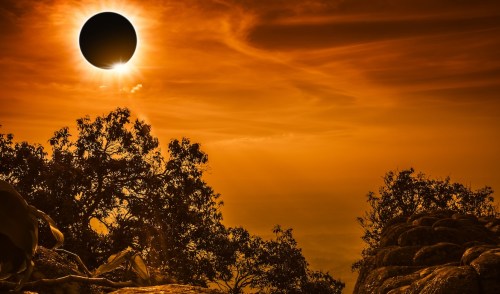Like a supercharged new moon, a solar eclipse in Aries occurs when the sun and moon align in the sign of Aries, in this case with the moon blocking (aka eclipsing) the sun’s light from our vantage point. While any solar eclipse is thought to signal the arrival of fated change and transformation, a solar eclipse in Aries—the sign of the zodiac most associated with the self and identity—tends to spark evolution around such Aries themes as self-expression and how we show up in the world.
A solar eclipse in Aries is anything but quiet. Aries is the first zodiac sign, kicking off the zodiac calendar with a hefty dose of passion and courage. As a cardinal sign, Aries is all about initiating things and can tap into an inner sense of confidence to blaze new trails. In turn, a solar eclipse in the sign brings a powerful sense of renewal for your sense of self and your passions and goals. Just note that the opening of this fresh chapter often requires the closing or ending of the one that came before it.
Aries is the first zodiac sign, kicking off the zodiac calendar with a hefty dose of passion and courage.
Given that Aries is also a fire sign ruled by Mars, a solar eclipse in Aries can push you to release your fears or inhibitions and take a step toward a more authentic, aligned version of yourself. This is not the time to be calculated or worried about perfecting a craft—Aries acts now and knows that the learning process along the way is part of the fun life has to offer.
When is the next solar eclipse in Aries?
The next solar eclipse in Aries is the total solar eclipse in Aries on April 8, 2024, at 2:21 p.m. EDT. (In a total solar eclipse, the moon moves directly in front of the sun from our vantage point, fully blocking its light and creating a period of darkness in the middle of the day, during which the sun’s corona—or outermost part of the sun’s atmosphere—becomes briefly visible.)
The following solar eclipse in Aries will be on March 29, 2025, and it will be a partial solar eclipse. (A solar eclipse in any given zodiac sign typically occurs once a year for about an 18-month period, after which point an eclipse won’t occur again in that same sign for roughly 18 years.)
What is a solar eclipse, and what does it mean in astrology?
A solar eclipse happens when the sun, the moon, and the Earth form a straight line, and the moon is directly between the sun and the Earth, blocking out or eclipsing the light of the sun from our view. While any new moon occurs when the moon moves between the sun and the Earth, for it to be a solar eclipse, the moon also has to be on the same horizontal plane as the Earth’s orbit—meaning it falls at the north node or south node, aka points in the sky associated in astrology with fate and destiny.
Just how much of the sun the moon blocks from our view determines whether the solar eclipse is total (fully obscuring the sun), annular (blocking out the middle of the sun and leaving a ring of sunlight visible), or partial (eclipsing a portion of the sun and leaving a crescent of sunlight visible). Each year, there are between two and five solar eclipses, but the one on April 8, 2024, is notable because it’s a total solar eclipse that passes directly over the United States, which hasn’t happened since 2017.
In any case, solar eclipses result in a period of darkness or semi-darkness during the daytime, which is part of the reason why they are associated with unexpected events and change. Even though a solar eclipse, in particular, may harness the fresh-start energy of a new moon (given it occurs during this moon phase), it also tends to bring a period of surrender and letting go simultaneously. And all eclipses, because of their proximity to the lunar nodes, interweave our fate and destiny.
Exactly how the fated changes of a solar eclipse will affect our lives depends on the zodiac sign in which it occurs. Ever since the north node moved into Aries in 2023 (and the south node, into Libra, its opposite sign), eclipses have been falling along the Aries-Libra axis, where they will remain through spring of 2025. In turn, we’ve been experiencing fated revelations along the dichotomy of Aries themes (self and identity) versus Libra themes (relationships, balance, and harmony with others). Ultimately, a solar eclipse in Aries will push us to go after our innermost desires—and leave any people-pleasing tendecies in the past.
Sign Up for Our Daily Newsletter
Get all the latest in wellness, trends, food, fitness, beauty, and more delivered right to your inbox.
Got it, you've been added to our email list.







